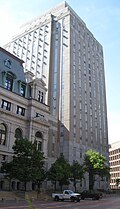| Boston Municipal Court | |
|---|---|
| (BMC) | |
 The Edward W. Brooke Courthouse, 24 New Chardon Street, Boston houses the Administrative Office of the Boston Municipal Court Department and is home to the Central Division. | |
 Interactive map of Boston Municipal Court | |
| 42°21′47″N71°03′42″W / 42.363007°N 71.061544°W | |
| Established | February 23, 1822 [1] |
| Jurisdiction | Suffolk County, Massachusetts |
| Location | Boston Massachusetts |
| Coordinates | 42°21′47″N71°03′42″W / 42.363007°N 71.061544°W |
| Appeals to | Appellate Division of the Boston Municipal Court (Civil) Massachusetts Appeals Court (Criminal) |
| Number of positions | 30 |
| Website | Boston Municipal Court |
| Chief Justice | |
| Currently | Tracy-Lee Lyons |
| Since | 2024 |
| Lead position ends | 2028 [2] |
The Boston Municipal Court (BMC), officially the Boston Municipal Court Department of the Trial Court, is a department of the Trial Court of the Commonwealth of Massachusetts, United States. The court hears criminal, civil, mental health, restraining orders, and other types of cases. The court also has an appellate division (composed of justices that sit in rotating panels of three) which reviews questions of law that arise from civil matters filed in the eight divisions of the department.
Contents
- History
- Boston Police Court and Justices' Court for the County of Suffolk
- Municipal Court of the City of Boston/Boston Municipal Court Department
- Probation pioneer
- Jurisdiction
- Divisions
- Composition
- Judges
- Chief Justices
- Notable former judges
- Specialty sessions
- Notable cases
- See also
- Images
- Notes
- References
- Further reading
- External links






